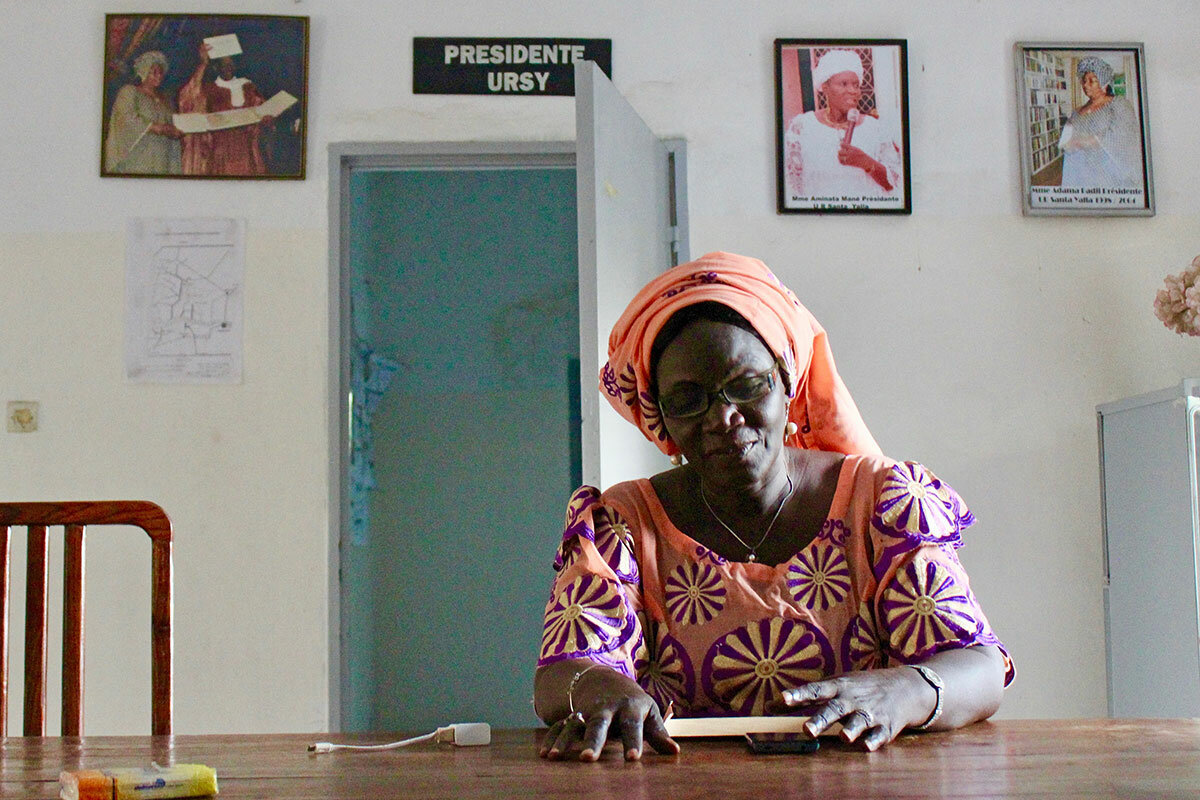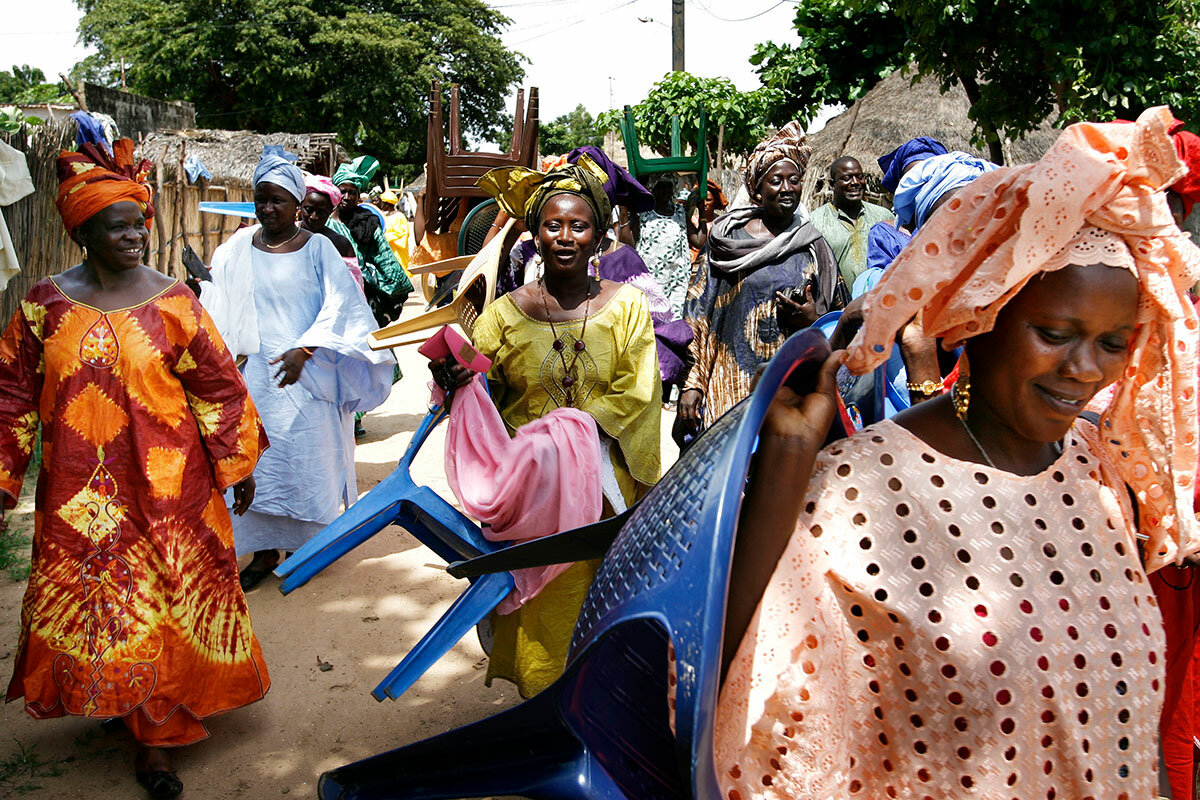In push to end FGM, local women offer influential message
Loading...
| Ziguinchor, Senegal; and Banjul, The Gambia
��
It was the biggest party Aminata Mané had ever been to, a riot of colorful dresses and exuberant dancing. There were enough fluffy piles of rice and roasted sheep’s meat for the entire village to eat until their stomachs hurt��– and it was all to celebrate her.
But Mrs. Mané, who was 11 at the time, couldn’t stop crying. She cried as her aunt led her from the ceremony into the party, whooping and cheering. And she cried as her mother leaned over her and whispered how proud she was. You were so brave, she said. She kept crying through the congratulations and the dances and the dinner, right up until the moment she was finally allowed to go home.
“How can you enjoy a party when you are in pain like that?” she says. “But it wasn’t only physical pain��– I cried because I didn’t want this, I didn’t choose this.”
For years, Mrs. Mané rarely talked about that day, when she and several other girls from her village returned from an initiation rite known locally as xarafal jiggeen, and in the parlance of the global aid world as FGM, or Female Genital Mutilation.
What was there to say? It had happened to her, just like it had happened to every other girl she knew in her community in Senegal’s southern Casamance region. It was as ordinary as the crackling call to prayer at the local mosque, or cooking chebujin, spiced tomato rice and fish, on a Sunday morning.��
And so afterwards, they had all simply carried on.
It wasn’t until nearly two decades later, when Mané’s in-laws summoned her eldest daughter for the rite, that a long-buried instinct clawed its way to the surface.
“I told them no��– absolutely not,” remembers Mané, who is now the president of Santa Yalla, a local women’s advocacy group.��“I know the psychological pain I still suffer from this, and I cannot let her go through that.”��
Globally, more than��200 million women and girls��have undergone some variation of FGM, , most of them scattered across some two dozen countries in Africa, the Middle East, and Asia. Many of these women go on to suffer severe medical complications, often during childbirth. Sex is frequently unbearably painful.��
In recent decades, their plight has become something of a cause célèbre in the international advocacy world, sprouting dozens of polished NGOs and high-level promises from bodies like the United Nations, which has pledged to . Forty two countries��– including both Senegal and its banana-shaped neighbor, The Gambia, have now partially or totally .
But in countries where FGM is also widely practiced, such vast international advocacy can backfire, by creating the uncomfortable implication that local culture is “wrong” and needs help from Westerners who know better. of Senegal’s 1999 law banning FGM, for instance, found that without local advocacy and buy-in, the threat of punishment alone did little to change people’s minds about cutting.
Instead, many activists say, the call to end FGM must come not just from lawmakers or international NGOs or UN resolutions.
It must come from inside.��In other words, it must come from women like Mané.
Since she first stood up to her in-laws 33 years ago, Mané has told her own cutting story dozens of times, perhaps hundreds��– in packed rooms and under baobab trees in remote southern Senegalese villages, on the radio to thousands of people she doesn’t know and at her own kitchen table, to her own daughters.
“When you are a victim yourself, then you have unique skill to talk about what’s happening,” she says.��
And a unique moral authority, too.��
After all, when a local woman��– a woman people in the community have gossiped with in the local market or knelt beside in mosque��–��stands up and says she suffered, it’s much harder for those around her to claim that anti-FGM activism is simply an import of a finger-wagging West, says Mary Small, the acting executive director of GAMCOTRAP, The Gambia Committee on Traditional Practices Affecting the Health of Women and Children, an NGO founded in the 1980s to fight FGM.��
“To do this you have to be part and parcel of that culture, to show that their experience is your experience too,” she says. “When people know you accept them, that you are not condemning them for how they live, they begin to listen.”��
Often, that work is slow going. In Gambia, three-quarters of adult women have been cut, and in Casamance, where Mané works, put the number at 69 percent.
But activists like Ms. Small and Mané are not dissuaded. They know that cultural values shift slowly��– often imperceptibly at first. At the root of their work, they say, is trusting that the women they work with are those best equipped to decide what is right for them and their communities.
“If you tell women the truth about what is happening to them, they will listen,” says Small, who before becoming an activist worked as a nurse in the delivery wards of several Gambian hospitals, and saw firsthand the painful medical complications of FGM. When she explains them to women now, she says, she finds they are often relieved to finally understand the cause of symptoms they have experienced.��
Many are often equally surprised, she says, to learn that there are no references to FGM in either Islamic or ���Ǵ��� religious texts (cutting is practiced by both groups in Senegal).
“They think it is a religious obligation for them,” she says.
Both Senegal and The Gambia have formally outlawed FGM��– Senegal in 1999 and The Gambia in 2015. But activists say that resorting to the law is, at best, a last resort. Their goal, after all, isn’t to make families who practice FGM out to be monsters, but to help them decide freely to change their minds, Small says. ��
So far, indeed, there has been only under the new Gambian law.��GAMCOTRAP, meanwhile, has convinced more than 150 “cutters,” the women who traditionally perform FGM, to abandon the practice, and given them money to start new businesses. The group’s��support comes from��, from Kuala Lumpur-based Musawah (which advocates “For Equality in the Muslim Family”) and the African Women’s Development Fund to UN Women and the European Union.
“Things are changing, but not because of the law,” says Jaha Dukureh, another Gambian anti-FGM activist.
Instead, says Mané, it’s happening because women are making it happen.
“In all the years I’ve been doing this, I haven’t seen any turning point, really,” she says. “But each day perhaps you change one person’s mind. And that’s a success. That’s one more girl who doesn’t suffer.”
Maguette Gueye and��Saikou Jammeh contributed reporting.��Ryan Lenora Brown's reporting in Senegal and The Gambia was supported by the International Reporting Project.










